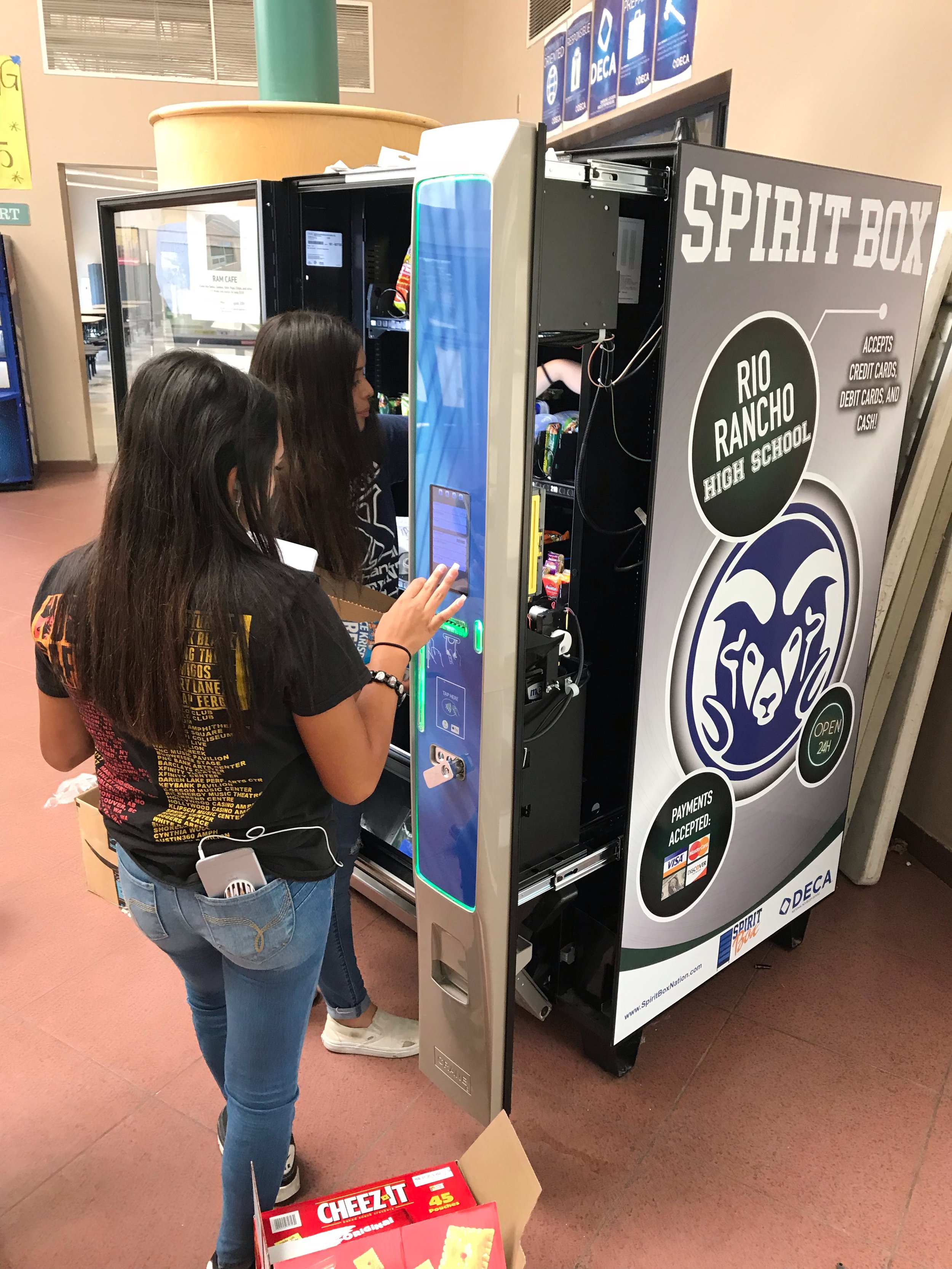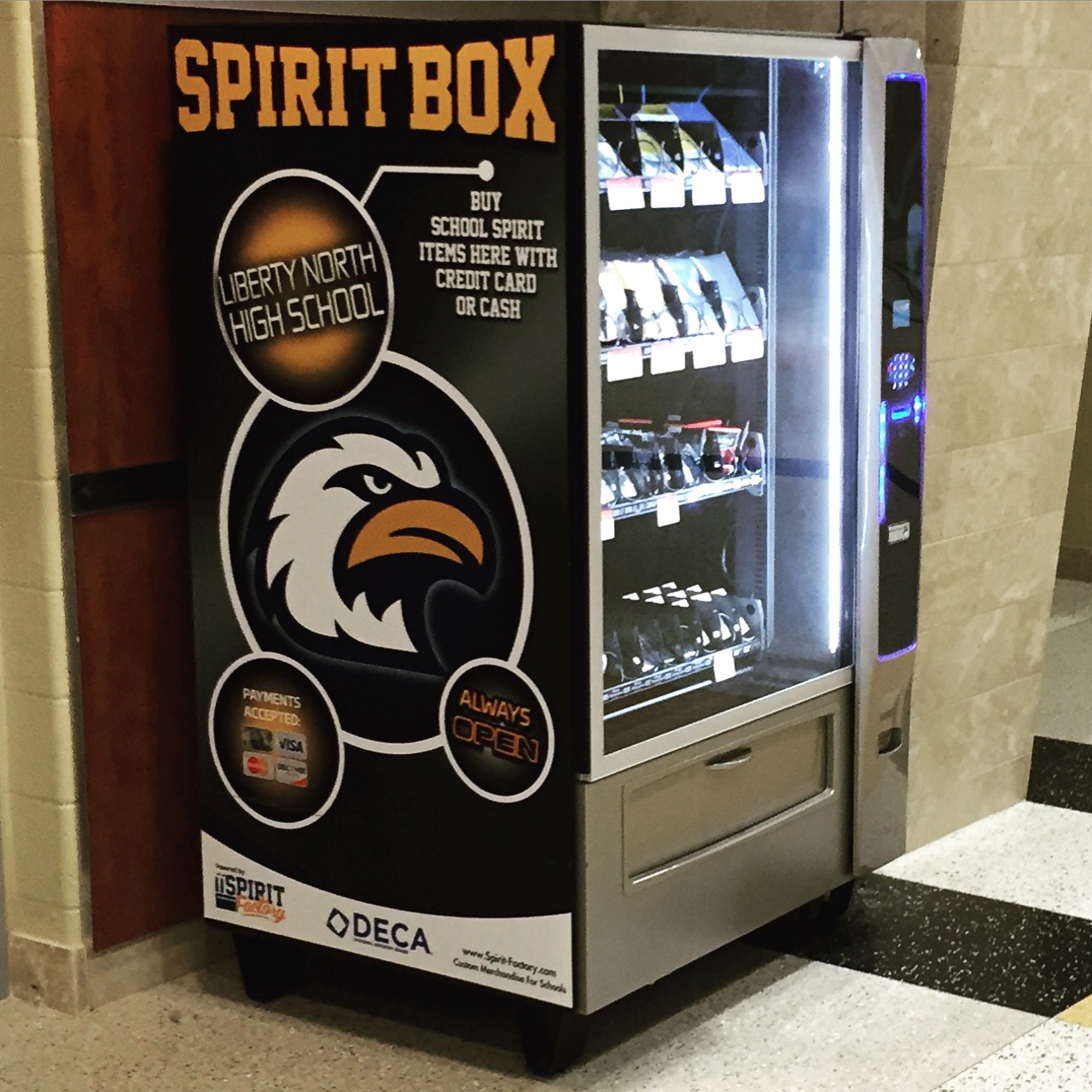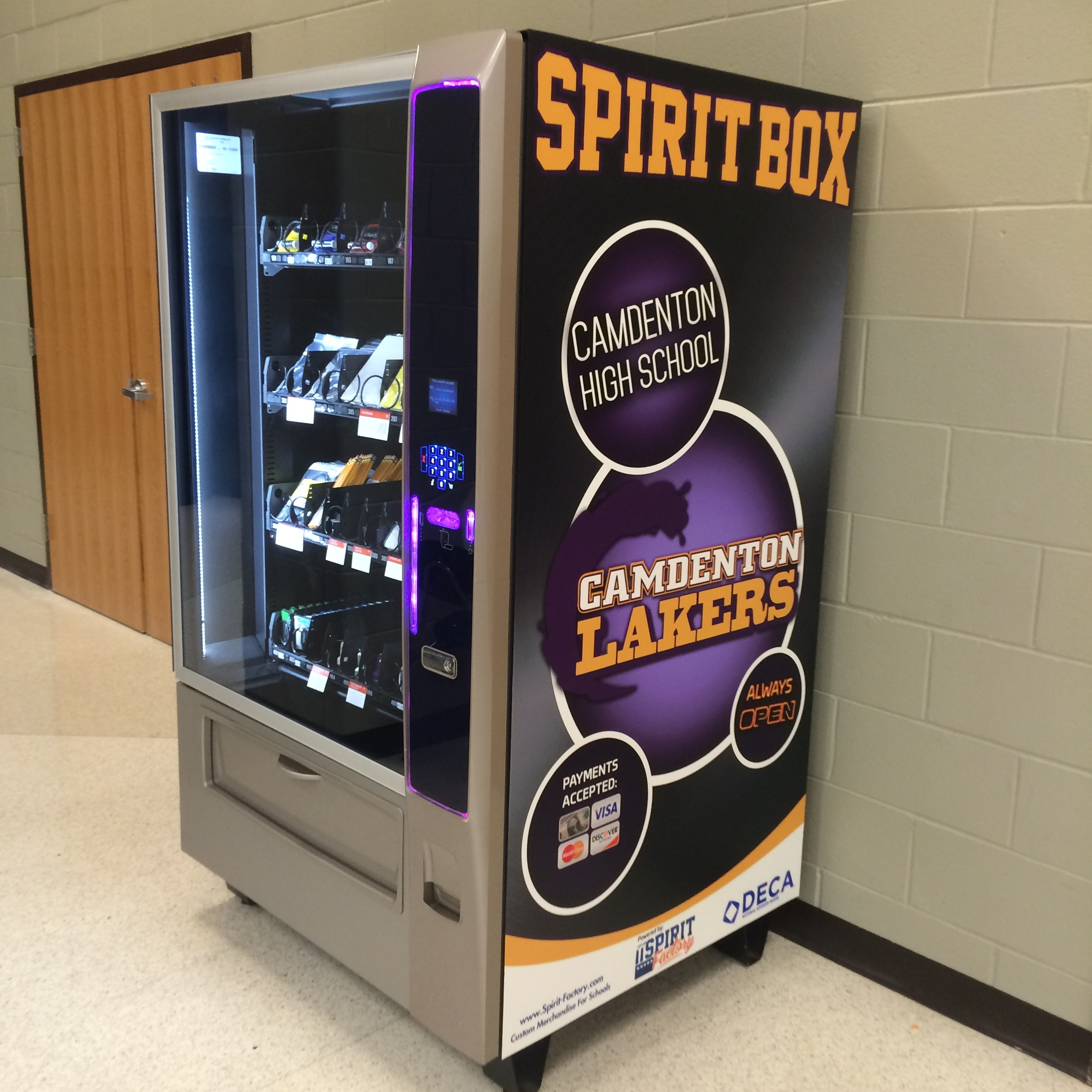10 Ways to Fund Your Spirit Box School Store
A Hands-On Guide for Schools
Every new business—especially one led by students—needs a start-up investment. For many schools, that initial funding can feel like an insurmountable challenge. But here’s the truth: that first step is a golden opportunity to build hands-on learning experiences and real-world business skills for your students!
At Spirit Box, we believe that school store vending is more than just selling snacks. It’s a career connected learning example that brings project based learning to life. When students figure out how to fund their school store vending machine, they’re practicing problem solving, teamwork, and communication—all key parts of hands-on learning and project-based learning.
We’re here to help you turn those first steps into a roadmap for success. Here’s your guide to funding your Spirit Box vending machine for schools—packed with fundraising ideas for schools, proven strategies, and real-world examples.
Plan Ahead: How Much Should You Raise?
The first part of any good plan? Knowing exactly what you’ll need. Don’t just budget for the vending machine itself. To make your school store vending project a success, be sure to include:
Additional product stock beyond the starter pack
The first batch of $1 coins for your coin operated vending machine ($200)
Office supplies, promotional materials, and launch day goodies
Fun, engaging launch events to get your whole school community involved
This planning stage is a hands-on learning activity—students can calculate costs, compare suppliers, and build a real budget. These are the kinds of hands-on activities in the classroom that help students see why financial planning matters!
Start in Your School
Why it matters: Your school’s leadership team—like your principal, assistant principal, or building administrator—can be your first and strongest supporters. Many principals have discretionary funds for innovative programs that support hands-on learning and career connected learning.
How to do it:
Pitch the vision: Explain how Spirit Box is more than just a school vending machine. It’s a project based learning platform that supports CTE pathways and career clusters.
Highlight the benefits: Show how Spirit Box can reduce classroom disruptions, foster positive climate, and create ownership and pride in your students.
Use data: Share how Spirit Box aligns with your school’s improvement plan or PBIS goals.
Tip: Even if your school doesn’t have direct funds, they can often connect you with district-level resources.
Connect with District-Level Funding
Why it matters: Districts often have funding streams to support student engagement, school climate, and project based learning. Staff like PBIS leads, CTE coordinators, and climate specialists can be great partners!
How to do it:
Find your champions: Reach out to district-level staff. They know about grants that might not be advertised at the school level.
Show alignment: Emphasize how Spirit Box brings hands on learning and career connected learning to life—two goals districts love to support.
Tip: Districts love seeing projects that benefit every classroom—highlight Spirit Box as a whole-school investment and get other clubs or groups involved.
Top Funding Sources to Explore
Once you have school and district buy-in, it’s time to explore different funding options. Here are the most effective funding sources for vending machines for schools:
1. Title I and School Improvement Funds
For Title I schools, these funds are designed to support student engagement, attendance, and school climate. Spirit Box vending machines for schools fit right in—especially because they boost student excitement and reduce behavior challenges.
How to use them:
Link Spirit Box to outcomes like improved behavior, attendance, and climate.
Use data—like climate surveys or behavior reports—to show Spirit Box’s impact.
Work with your Title I coordinator to ensure your project aligns with your school’s goals.
Fun Fact: Title I is the oldest and largest federal education program, and it’s all about making sure every student has the resources to succeed.
2. School Climate & Culture Funds
Many districts allocate funds to improve school culture—and what better way than by bringing in a school supply vending machine that rewards students and promotes leadership?
How to use them:
Connect Spirit Box to PBIS, SEL, or climate-building efforts.
Use student surveys and climate data to make your case.
Show how Spirit Box supports positive behavior and school pride.
3. PTA / PTO Contributions
Parents love to see their contributions making a real difference! PTA/PTO funds can be a perfect match for your school store vending project.
How to do it:
Create a short, engaging pitch for your next meeting.
Use visuals—like videos, photos, or testimonials—to help parents understand how Spirit Box works.
Keep them updated—families love seeing their support in action!
4. Community Business Sponsorships
Local businesses love investing in future leaders! A school vending machine project is a great way for them to show their support.
How to do it:
Offer sponsorship perks, like logos on your vending machine or mentions in newsletters.
Be clear about how their support helps—like funding restocks or sponsoring launch events.
Tip: Start with businesses that already support schools, like local banks, restaurants, and stores.
5. Third-Party Fundraising Platforms
Websites like DonorsChoose, GoFundMe, and AdoptAClassroom make it easy to share your project story and collect donations.
How to do it:
Create a project page with clear photos, student quotes, and a clear funding goal.
Share the link widely—through newsletters, social media, and even QR codes around your school!
Tip: Updates are key. Let donors know exactly how their contributions are making a difference.
6. Classic Fundraising Events
Fundraiser ideas for schools don’t have to be complicated! Classic events bring the community together and can make a big impact.
Examples:
Bake sales, car washes, or candy bar sales
Talent shows or spirit nights
Fun challenges—like a teacher “pie in the face” contest!
Tip: Combine events with online campaigns to multiply your impact.
7. Foundation and Community Grants
Thousands of foundations love supporting hands-on activities for students and programs that promote career connected learning.
How to find them:
Start with local community foundations—they often have small grant programs for schools.
Use aggregator sites like GetEdFunding, GrantsAlert, or GrantWatch for national opportunities.
Tip: Foundations want to see clear plans and real impact—so be specific about how Spirit Box boosts hands-on learning and school culture.
8. Carl D. Perkins Grant Funds
Many Spirit Box schools have tapped into Perkins funding to support their CTE pathways. Perkins grants are all about building career connected learning—perfect for your Spirit Box!
How to do it:
Connect with your school’s CTE coordinator or your state’s Perkins contact.
Highlight how Spirit Box gives students real experience with budgeting, marketing, and operations.
Tip: Many states accept Perkins grant applications in the spring, with awards in the summer.
Other Grants to Explore:
9. Student-Led Business Models
Why not have students raise the funds themselves? It’s the ultimate hands on learning activity—and it builds career connected learning from day one!
Examples:
Selling spirit wear, school supplies, or smart snacks for schools
Running pop-up shops at school events
Rotating jobs so students learn marketing, finance, and teamwork
Tip: Tie these efforts into lessons on entrepreneurship—like a real business class in action!
10. Local Government Mini-Grants
Many cities and counties offer small grants for innovative student-centered projects.
How to find them:
Contact your city council or local economic development office.
Check your city’s website for community improvement funds or mini-grants.
Tip: Highlight how Spirit Box builds pride and leadership skills—local leaders love that!
Bonus Funding Ideas
Program Fees: Some schools charge a small fee—like $5–$10—to cover start-up costs. Because every student benefits, families usually see this as a worthwhile investment.
Borrow or Partial Repayment: If you’re still short on funds, offer to repay part of a donation once Spirit Box is up and running. It shows you’re serious and committed to making it work.
Combine Strategies: Most successful Spirit Box teams mix 2–3 funding sources to cover everything from the vending machine itself to launch events and ongoing restocks.
Timing: Key Dates to Maximize Funding Opportunities
Timing is everything when it comes to funding your school store vending machine project. School and district budgets typically reset at the end of June or early July, and this can have a big impact on when to secure funding for your Spirit Box.
Here’s what you need to know:
End-of-Year Spending (June):
Many schools and districts need to spend leftover budget funds before the fiscal year closes on June 30th. If your school vending machine project is ready to go, June can be the perfect window to secure funding before money reverts to district or state reserves.
Tip: Be prepared! Have your request finalized and ready to go by mid-June so you’re first in line.
New Budget Year (July 1st):
Most school budgets reset July 1st—this means fresh funds are available, but competition can be fierce. Many schools prioritize essential purchases, so getting your request in early can make all the difference.
Tip: Aim to submit your request by early July to ensure your school store vending project is among the first reviewed in the new fiscal year.
District-Level Grant Cycles (Spring):
Some district-level or federal grants—like Carl D. Perkins or Title I improvement funds—are reviewed in the spring (often March–May) with awards announced in the summer.
Tip: Start planning early! Reach out to your Title I or CTE coordinator in January or February to learn your district’s timeline and process.
Fall Semester Planning (August–September):
Back-to-school season is prime time for launch events and for linking your school store vending machine to project-based learning activities and career connected learning.
Tip: Even if you’re still finalizing funds, use this time to engage your team and build excitement for the launch!
Understanding these timelines ensures you’re not left scrambling. It also gives you a strategic advantage: schools and districts often prioritize projects that are planned early and show clear alignment with fiscal goals.
Why Hands-On Learning Matters
At Spirit Box, we believe that hands-on learning is the heart of career connected learning. Students thrive when they can connect what they learn in the classroom to real-world challenges.
Running a school vending machine teaches skills like budgeting, marketing, and problem solving. It’s project based teaching in action, and it’s an experience students will carry with them into every future job, college opportunity, and leadership role.
This isn’t just a vending machine—it’s a hands-on learning activity that builds confidence, teamwork, and real-world skills. That’s why Spirit Box is proud to be part of your school’s journey.
Final Thoughts
Raising funds is more than a task—it’s a real-world project-based learning opportunity that prepares students for the future. With Spirit Box, you’re not just setting up a vending machine. You’re launching a hands-on, student-led business that teaches life-changing skills.
Ready to get started? Let’s bring career connected learning to your school—together.
____
Be sure to check back or follow us on Twitter, Instagram or Facebook for more stories like these.



